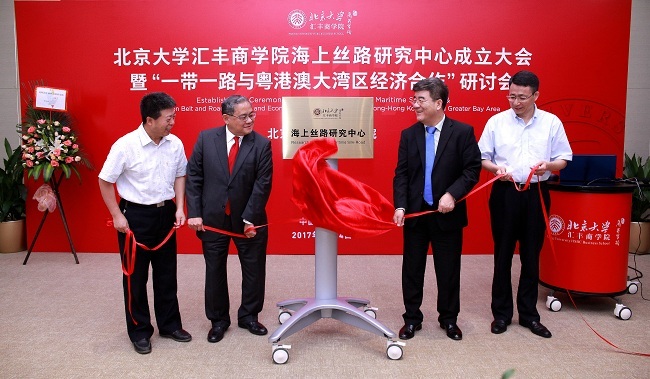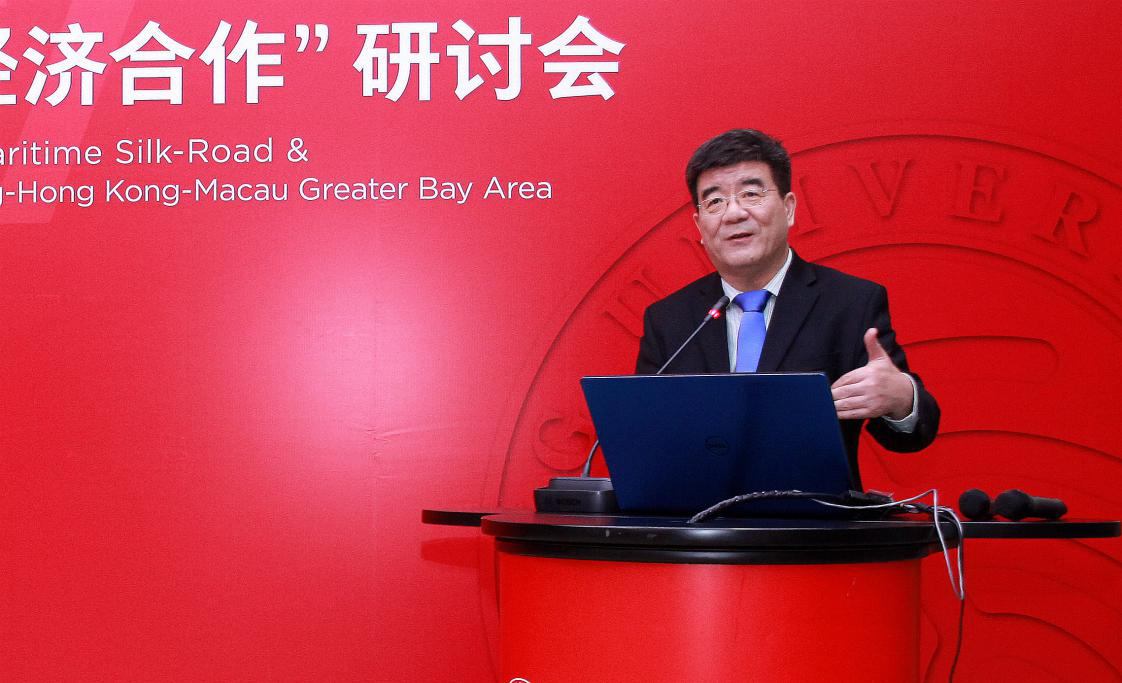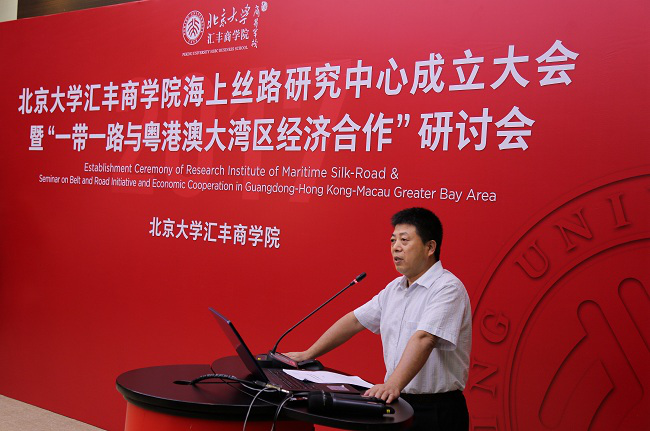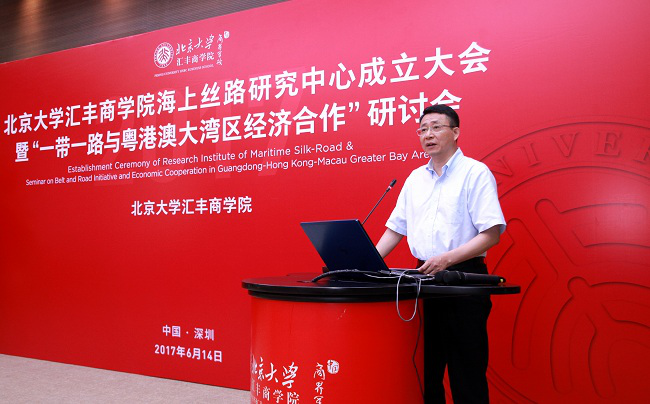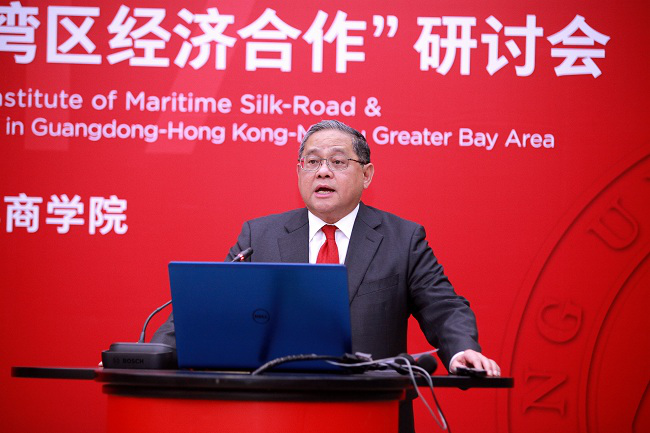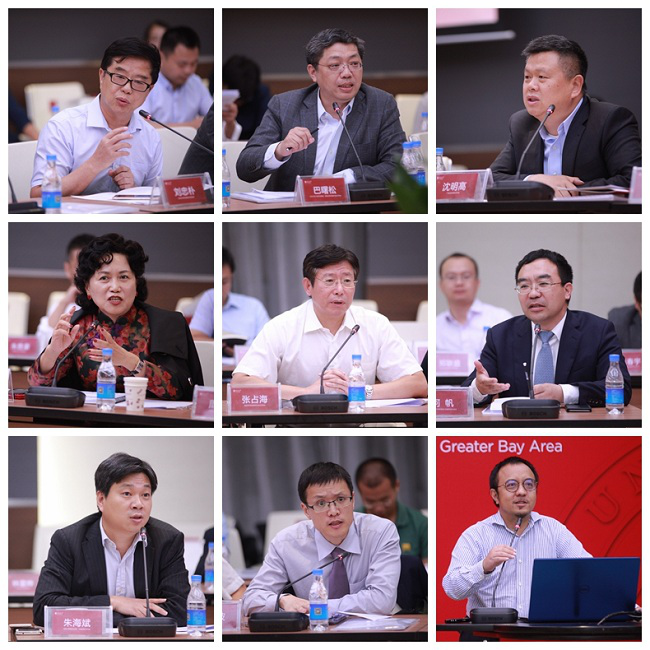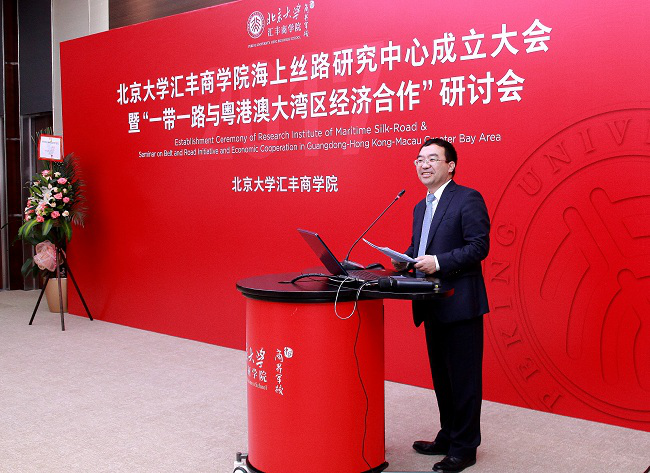One of the biggest stories in Asian business is China’s “the Belt and Road” initiative, an economic and diplomatic program that could transform trade. According to Financial Times, the initiative will serve as a stimulus for trade in a world struggling with middling economic growth and stalling trade volumes.
In this context, Peking University HSBC Business School (PHBS) established the Research Institute of Maritime Silk Road (RIMS), in order to better serve regional economic development in south China. As a high-level think tank, RIMS focuses on research concerning “the Belt and Road” initiative, which consists of two main components, the land-based Silk Road Economic Belt (SREB) and oceangoing Maritime Silk Road (MSR). MSR aims to foster collaboration in Southeast Asia, Oceania, and North Africa.
On June 14, 2017, PHBS held an establishment ceremony for RIMS and a seminar themed with “
the Belt and Road Initiative and Economic Cooperation in Guangdong-Hong Kong-Macau Greater Bay Area”. Individuals in attendance for the unveiling ceremony were You WU, deputy secretary general of Shenzhen Municipal People’s Government, Wen HAI, vice chairman of Peking University School Council, PHBS dean and other personages.
the unveiling ceremony
RIMS covers a wide range of research fields, including regional studies and marine economy, investment, macroeconomics and strategy. It will provide proposals for domestic development strategy, macro-policies, economic development in Guangdong-Hong Kong-Macau Greater Bay Area, as well as counseling towards international economic relations and macro-economics for financial institutions and enterprises.
Dean HAI addresses on the ceremony
At the very beginning of RIMS establishment ceremony, PHBS Dean Wen HAI extended thanks to Shenzhen Municipal People’s Government, Peking University and leaders of Peking University Graduate School for their constant support. He indicated that RIMS was one part of PHBS’ efforts to become the world’s top business school. Then, You WU, deputy secretary general of Shenzhen Municipal People’s Government, Wenchang TAN, secretary of Peking University Graduate School Party Committee addressed the meeting, respectively.
Wenchang TAN, secretary of Peking University Graduate School Party Committee addresses the meeting
You WU, deputy secretary general of Shenzhen Municipal People’s Government gives remarks on the meeting
Gunning FUNG, chairman of FUNG Group delivered a keynote speech themed with new trend of global supply chain brought by “the Belt and Road” initiative as well as opportunities and challenges towards Guangdong-Hong Kong-Macau Greater Bay Area. “The Belt and Road” initiative will not only provide important arena for China in its diplomacy, economy, trade and cultural exchanges, but also boost China’s economic transition, emphasized FUNG. He said, enterprises in Guangdong, Hong Kong and Macau should grasp the opportunities to push forward domestic development, as well as search for self-growth.
Guojing FUNG, chairman of FUNG Group delivers a keynote speech
After that, on the seminar named
“the Belt and Road Initiative and Economic Cooperation in Guangdong-Hong Kong-Macau Greater Bay Area”, scholars and business people made further discussions on the theme. They are Zhanhai ZHANG, head of Strategic Planning and Economy Department, State Oceanic Administration, Shusong BA, professor of PHBS, chief economist of China’s economy in Hong Kong Stock Exchange, chief economist of China Banking Association, etc.
scholars and business people make further discussions on the seminar
Fan HE, director of RIMS, recently addressed on the parallel session of “the Belt and Road” International Summit Forum. According to him, RIMS, serving as the branch of “the Belt and Road” Research Institute of Peking University, will be built into an influential think tank worldwide. To this end, RIMS will set up a team consisting of top scholars from PHBS and overseas top universities, which includes PHBS Professor Gang FAN, PHBS Professor Shusong BA, Professor Jianguo XU from National School of Development at Peking University, etc; and a host of senior researchers from top academic institutions, such as Peking University, Chinese Academy of Social Sciences, etc will also join in the team.
The core members of RIMS research team have already participated in major policy deliberations and decisions including the reform of interest rate policy in 2005, Chiang Mai Initiative Multilateralization in 2010, G20 summit in 2016 and so on. At present stage, RIMS will offer research consulting on policy-making of China’s economy and economic development of Guangdong-Hong Kong - Macau Greater Bay Area. Meanwhile, it will also host international symposiums, academic seminars, domestic and foreign surveys, etc.
“RIMS will focus on regional studies and marine economy, investment, macroeconomics and strategy,” said Professor HE. “Through intensive field study, RIMS will conduct in-depth research on the politics, economic and social situation of countries in the Maritime Silk Road area, establish ties with those countries’ think-tanks, and establish a Maritime Silk Road think tank union.” RIMS has also recently finished such widely concerned research projects as Quarterly Report on Global and Domestic Macro-economy, Industrial Development Layout of Guangdong- Hong Kong -Macau Greater Bay Area, etc.
Fan HE hosts the establishment ceremony and seminar
It is reported that RIMS will host “
the Belt and Road Initiative Financial Supports” symposium in Beijing on June, 17, 2017. Scholars and officials including Dongsheng Zhai, Deputy Director of Department of Western Region Development, National Development and Reform Commission,Jian TAN, deputy director of International Economy Department of Ministry of Foreign affairs and other personages will attend the event to make in-depth discussion on what role that finance is playing in “the Belt and Road” initiatives.
By Sophie WU
Edited by Annie JIN





